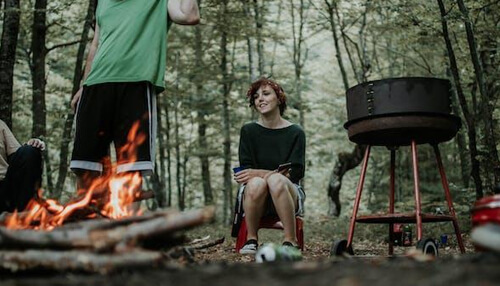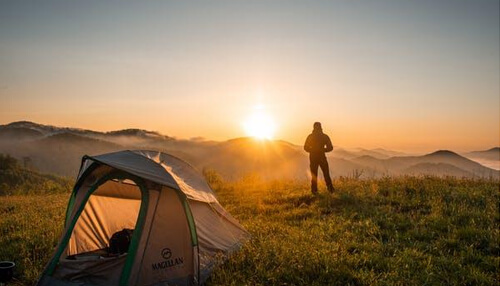Camping in nature is for many people the best way to spend your free time, but it is an activity that requires some know-how. The aim is to relax in the fresh air, soak up the incredible view and explore the surroundings, but as nature can be unpredictable, you want to make sure you venture it prepared.
Here are several handy tips that can help you get organised and prepared for your adventure in nature.
Plan ahead
Planning ahead is the key to success. It may seem obvious, but it is an essential camping tip. Regardless of the campground you choose, be sure to check the neighborhood. Look for freshwater sources, inspect the type of ground and if it’s possible to easily set up a tent there.
Also, many campgrounds require reservations, sometimes even 6 months or a year in advance. If it’s simply the first-come, first-served type of campsite, plan to arrive early so you can get the best location. You would also need to research the campground’s rules and regulations about food and fire hazards. Depending on your location and the wildlife in the area, you might need to follow specific food storage regulations.
Fire restrictions usually change during the year depending on the fire danger, so it’s wise to check beforehand. The more you plan ahead, the easier it will be for you when you arrive at camp.
Be prepared to navigate
We’ve become very dependent on modern technology for navigation, but it can easily happen that you won’t have any cell service, or you might even lose your phone. Therefore, it’s smart to have a backup navigation method such as downloaded digital maps and driving instructions, as well as a good old paper map and a compass.
Another safety precaution to take is to let your family and friends know where you are going and when you’re expected to be back. Let them know when you return, and if they don’t receive any news from you, instruct them to contact the local ranger station.
Pack the essentials…..and a few luxuries
Start by gathering your gear and essentials, but try not to overdo it. People tend to get the biggest backpack they can find and over-pack it with stuff they don’t need. As a beginner, a smaller, 50-litre backpack will suffice and it’ll help you stick to minimalist backpacking.
When it comes to camping gear, the choice is huge. Still, you don’t need everything you see in the shops, only a few good quality items like a tent, sleeping bag, high-quality automatic knives, and some cooking equipment. For your first trip, borrow a few items from friends, and when you get more experienced, you’ll know what to buy for your next camping trip. Also, don’t forget to bring trash bags, so you leave no trace behind!
In addition to these essentials, a few luxury items will help you feel more at ease. This could be a comfy pillow, good coffee gear, or some books and games. One of the perks of camping is that it gives you a chance to simplify things and disconnect. As much as it can be great to bring extra stuff, try to keep it down to a minimum.
Plan your meals beforehand
You might feel tempted to buy your camping food on the way from a supermarket. However, as much as this could be a life-saver, try to avoid it – if you pack without your food at home, you’d probably underestimate the space reserved for the meals. Whereas if you prepare your food at home, you’ll be able to optimize your budget and have ready-to-go healthy meals for the trip. You can also prep certain ingredients that you can cook on-site, but make sure you also pack quick snacks such as apples, carrots, granola bars and beef jerky. Look online for easy-to-make campfire recipes so you don’t have to give up great food just because you don’t have the proper kitchen. And, don’t forget about dessert! Campfire cinnamon rolls, banana boats, and cones are all delicious treats!
Play it safe
Going hiking in the mountains while you’re camping is great as Mother Nature is at its best there, but you need to make sure you stay safe. Pick well-established paths so you don’t risk getting lost if you leave the traced path, particularly when it gets dark. It’s best to take a detailed look at the trail you plan to take as well as the type of region. Go through the altitude diagram and look for some flat places, usually at a lake.
Also, pay attention to your camping spot location and orientation in reference to the sunrise, and in case it rains, you don’t want to be in a low place where the water gathers. Finally, be sure you plan your activities during the day so you don’t have to search for the campsite in pitch darkness.
Have fun!
Don’t let your time in nature be marked with constant worry – use this time to have fun as well, especially if you’re camping with your kids. There are lots of different fun activities you can plan for everyone to participate in. For instance, organize a scavenger hunt but include things commonly found in nature, such as rocks, twigs, flowers, and animal tracks.
You can also bring various games such as cards and board games. People are generally too obsessed with packing their camping gear so they forget to include a few interesting games that can help fill up their free time without any modern tech.
Going camping for the first time can be a bit intimidating. Hopefully, the excitement will take over and keep you on track. Essentially, everyone’s a beginner, and it takes time to get the hang of things, but there’s always something to learn. Rely on the tips listed here and start your camping adventure!





